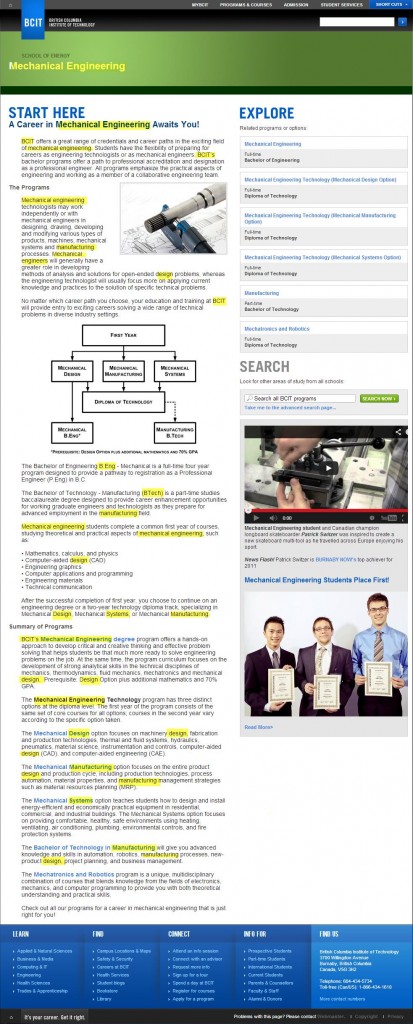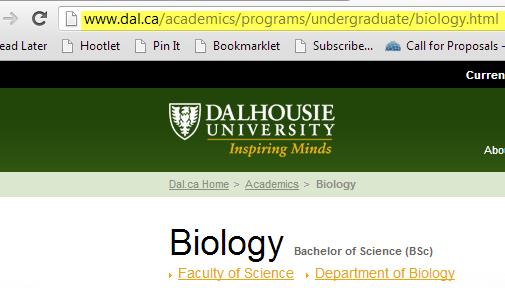On-page SEO and off-page SEO (links) determine how your pages rank in search engine results. This post takes a look at the basic on-page SEO elements that higher ed marketers need to understand and apply to ensure that their websites are getting respectable search rankings.
In higher ed, SEO is often overlooked as a priority in the marketing mix. I believe one reason for this is that higher ed marketers have an over-inflated sense of their branded keyword rankings because of the (no longer existing) .edu authority factor and simply don’t take the time to push program keywords any further. Regardless, a competing program’s .edu domain has authority equal to their .edu domain, leaving them on a level playing field for program level keywords. Effectively managing these basic SEO elements can produce a very positive ROI on your marketing investment and give your page’s higher search engine rankings.
SEO experts spend lots of time analyzing the search results of their pages to try and understand the nuances of the search engines ranking algorithms. If you are looking for that level of detail, (and debate), there are lots of other resources available online. With the release of the new Google Penguin update this last week, the SEO community’s wheels have once again begun to spin rapidly to decode the any changes that will affect their current site rankings. We will leave that to the experts and focus on basic SEO, where the 80:20 rule applies. You can get 80 % of the benefits of on-page optimization by focusing on the 20% of the factors that are critical.
So let’s take a look at these key on-page factors:
Content
1) As I am sure you are quite sick of hearing, high quality, unique content is the most important element in your on-page SEO strategy. The search engines reward fresh, genuine, novel, finely tuned content with high rankings. It is a simple and as hard as that. Get you content strategy in place and start regularly publishing high quality content and you will see your results climb.
HTML
2) Page Title tags – Title tags are the main text headings that describe your pages. They show up at the top of your browser, in your browser tabs, and in search engine results as seen in the highlighted text in the examples below.
Best practices recommend that you put your brand name and the main keywords up front in the phase. Maximum length should be about 70 characters.
3) Meta description – The meta description is not important to your search engine ranking per say, because search engine generally ignore this tag, but it is key to describing what is on the page for the visitor by bolding of the text in the visual snippet presented in the search result as below.
4) Keywords – Please don’t stuff your pages with keywords to get higher ranking. That will not work, and in fact, might get you penalized. The experts say to use them 2 – 3 time on a short page and 4- 6 times on a long page. It also helps to get the main keywords positioned early in the page.
In the example below, keywords, as defined by the page,
<meta name=”keywords” content=”BCIT, mechanical engineering, B.Eng, design, manufacturing, systems, BTech in manufacturing”>
are seen as highlighted text;
 5) H1 (Headline) tags – Although it is not clear that the H1 tag helps in ranking, it is still recommended by most experts as a important element of your on-page optimization. The H1 tag should be used to indicate the headline of the page.
5) H1 (Headline) tags – Although it is not clear that the H1 tag helps in ranking, it is still recommended by most experts as a important element of your on-page optimization. The H1 tag should be used to indicate the headline of the page.
The H1 tag for the previous BCIT page example is:
“h1 id=”tagline”>A Career in Mechanical Engineering Awaits You!“
6) Alt Image tags – Alt image tags provide a text description of images on your page. Keyword phrases should be used where possible in the tag.
7) Internal links – Insert at least one link on each page within the content of the page that links back to a higher level, related category page on your site.
Info Architecture
8) Your URLs – The URL titles of your pages should semantically represent the information hierarchy of your page. Here is a good example below. Good URLs make it simpler for search engines to determine what search queries are most relevant to your pages. Short, descriptive URLs are good for search engines rankings and from a user point of view, very helpful when browsing your site.
Performance
9) Crawl ability – This is probably self-evident but your site should not have any crawl errors. For example “404 page not found errors” are a pretty serious no-no with respect to the search engine and definitely have an effect on how they rank your site. A current site map on your site also really helps out to make sure your content is all searchable.
10) Page Load Speed – Page load speed seriously affects the user’s experience on your website so it only makes sense that if your site is clunky and slow that the search engines will penalize you with respect to your page ranking. Users expect pages to load within 2 seconds and start dropping off like flies for every second longer they have to wait. Page load speed can be tested with many freely available tools so it is fairly easy to diagnose this if you have a problem. If you do have a problem, get to work to optimize those pages to improve the load time. Get your techies involved to help you out with this process if it looks like you have serious load time problems. A server upgrade may be needed if you system is maxed out.
We have covered the main elements which effect your page rankings in this post but if you are really interested in this material, then dig deeper into the references and you will find out about hundreds of lesser elements that will also have an effect. Of course no one but the search engine people themselves actually know the absolute impact of these variable so recognize that these are best guesses on a system that is always in flux. But we do the best we can…..
How much time do you invest in managing your website’s main SEO elements at your institution? What single element in your site development or maintenance do you think has the most impact on your rankings? Are there other elements that you have prioritized?
References:
The Beginner’s Guide to SEO http://www.seomoz.org/beginners-guide-to-seo
On-Page Factors http://www.seomoz.org/learn-seo/on-page-factors
Search Engine Land’s Guide To SEO http://searchengineland.com/guide/seo
The Periodic Table Of SEO Ranking Factors http://searchengineland.com/seotable












